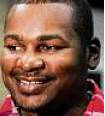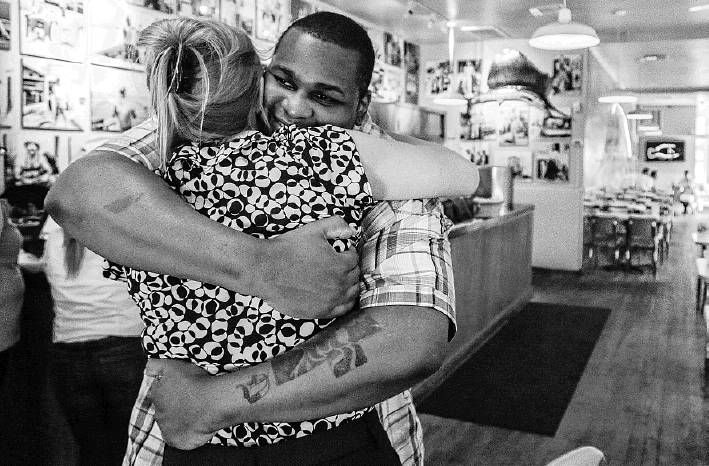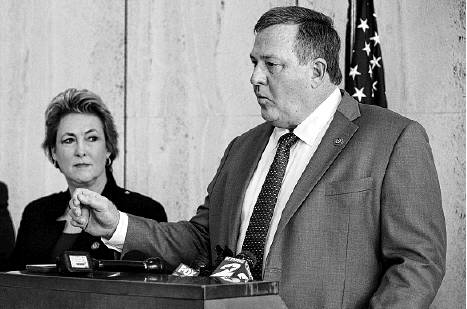Judge declares Brown ‘actually innocent’
Finding could help man wrongfully convicted in cop killing receive $2M in compensation
By Keri Blakinger STAFF WRITER
Four years after Alfred Dewayne Brown was freed from prison and 16 years after the crime that sent him there, a Harris County judge on Friday signed the order declaring the former death row inmate actually innocent.
The much-awaited move could clear the way to nearly $2 million in state compensation for the time Brown spent wrongfully imprisoned for the 2003 slaying of Houston Police Officer Charles Clark.
“The law of the state of Texas entitles him to compensation, but it can never fully compensate him for spending 12 years in prison for a crime that he had no involvement in,” said attorney Neal Manne. “But he’s entitled to the compensation, and I hope that he can now lead a peaceful and happy life.”
The man at the center of it all — now 37 and living in Louisiana — did not attend the hearing.
“Dewayne was peaceful and graceful today,” said Brian Stolarz, one of the attorneys who helped get him out of prison. “He thanks his lawyers and supporters and thanks the district attorney and special counsel for their thorough investigation. Clearing his name has been the goal since he was released almost four years ago, and to those who seek otherwise, he meets hatred with love.”
When the south Houston man was originally freed in 2015, then-Harris County District Attorney Devon Anderson asked to dismiss his case but never said he was “actually innocent,” which is required for him to get money from the state.
Current District Attorney Kim Ogg last year hired special prosecutor John Raley to reinvestigate the case. After 10 months, Raley pushed out a hefty report dubbing Brown innocent. But still, it wasn’t clear whether Judge George Powell’s court had jurisdiction to re-dismiss an already closed case, this time with the word “innocence” in the signed order.
Powell spent two months grappling with the legal question before issuing his decision Friday morning, in a small side courtroom in the Harris County Juvenile Justice Center. After a short hearing, he signed off on the one-page order.
“Alfred Brown was wrongfully convicted,” Ogg said outside the courtroom. “Given the state of the evidence today and the law as it’s applied, we don’t believe that any reasonable juror would find Alfred Brown guilty under the evidence as it exists now.”
Mixed reaction
For the county’s top prosecutor, the latest development could bring closure to a thorny case that’s plagued her tenure in office, putting her at odds with the police union, whose officials vociferously maintain Brown’s guilt.
“I don’t know why Kim Ogg continues with this obsession of trying to make him actually innocent when in fact, the facts don’t back it up,” Houston Police Officers’ Union President Joe Gamaldi said after court, promising to fight the outcome and bring the case to the Texas Office of the Attorney General to halt any possible payment.
He called Raley’s report a “farce” and noted that the longtime civil attorney contributed to Ogg’s 2016 election campaign.
“It’s not fair,” he added. “These families deserve justice, and Alfred Brown remains to this day the No. 1prime suspect.”
Afterward, former union president Ray Hunt hurled a few insults at prosecutors, accusing them of lying before leaving in anger. Later in the day, the union issued a statement reiterating their position, asserting that no police investigators believed him innocent and calling Ogg a “complete disgrace.”
Raley, meanwhile, defended his work.
“The union attacked my report before they even read it — I’m still not sure if they have read it,” he said. “I’ve asked the police officers if they can name one single fact in my report that’s not true, and they can’t do it.”
New evidence
Brown was sent to death row in 2005 for allegedly killing Clark during a botched robbery of a check-cashing store. During trial, prosecutors argued that Brown had shot the officer while his co-defendant Elijah Joubert had killed store clerk Alfredia Jones. Both men were sent to death row, while a third co-defendant — Dashan Glaspie — got a 30-year sentence in exchange for his testimony.
But Brown always said he was innocent and that he’d been at his girlfriend’s apartment just after the slaying. The proof, he said, was in a phone call he’d made to his girlfriend at work that morning.
For years, officials claimed they had no records of that call. Then in 2013, police investigator Breck McDaniel uncovered the phone records in his garage — a discovery that paved the way for Brown’s release.
At first, prosecutors said the evidence had been inadvertently misplaced and not intentionally concealed.
But last year, Ogg’s office recovered a 2003 email showing that McDaniel had told former prosecutor Dan Rizzo about the phone records well before the case went to trial.
Though Rizzo through his attorney has consistently maintained that he never read the email, the discovery was enough to push Ogg to review the case at length before announcing Raley’s finding in March.
Brown still has a pending civil lawsuit against the city and county. But now the freed man and his lawyers will be able to go back to the Texas Comptroller of Public Accounts to request compensation under the Timothy Cole Act and wait — again — for approval.
“Provided the new application meets the qualifications and pending review from our office, yes, Mr. Brown would qualify for compensation,” said comptroller spokesman Chris Bryan. “He just needs to send us the paperwork.” keri.blakinger@chron.com


